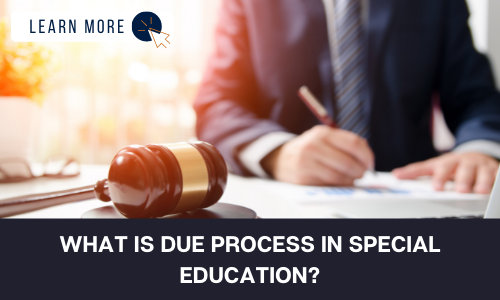What is Due Process in Special Education?
 |
 |
PDF Version: What is Due Process in Special Education?
PDF Version: Full Guide of all 30+ Flyers (Compiled as a Booklet)
Versión en Español en Formato PDF: ¿Qué es el Proceso Legal Debido en La Educación Especial?
If you have a disagreement with your child’s school about their special education services, you have some options to solve it. One option is Due Process. Due Process is only for students in special education. This is a formal, legal way to resolve a dispute. It is a last resort for resolving a complaint with the school. It is often not a quick process. It may take up to two years for a decision to be made.
Who requests Due Process?
The parent(s) can request Due Process. The school can also request it. The student can request it if they are 18 or older.
You or the school must request Due Process within two years of both of you knowing about the issue that triggered the request for Due Process.
How do you file a request for Due Process?
BEFORE you request Due Process, you should contact both Families Together and the Disability Rights Center for free help about your rights. The Kansas State Department of Education has a Due Process form that you fill out. The Due Process form includes the instructions on where to send it. Once the school receives it, they will provide you with information about free or low-cost legal services. They will also send you a copy of your Parents’ Rights.
Find the Dispute Resolution forms here.
Do I have to pay for Due Process?
No. Requesting a Due Process hearing is free. However, a Due Process proceeding is often long and difficult. The school does not pay for your attorney. You will have to pay the legal bills if you choose to be represented by an attorney in this process. You do not have to have an attorney. You may represent yourself and your child without an attorney. However, if you lose the due process hearing, you could be responsible for all of the school’s attorney’s fees.
What is “Stay Put”?
Once the request for Due Process is filed, your child will stay in the school setting that they are in. This is called “stay put.” If you and the school agree to move your child to a different setting, that is allowed. But, if you file Due Process, the school cannot change your child’s setting without your approval.
What happens at the Due Process hearing?
First, there will be a preliminary meeting between you and the school. This is called a resolution session. This has to happen within 15 days of you filing the complaint. Someone from the school that is allowed to make decisions on your child’s special education services needs to be there. The school cannot have their attorney present unless the parent also has an attorney there. This meeting is a chance for the school to solve the issue without you continuing to proceed with a Due Process hearing.
If the complaint is not resolved to your satisfaction within 30 days of that meeting, then there can be a Due Process hearing. There will be hearing officer appointed to the case. They cannot be an employee of a State or local educational agency. At the hearing, the parent(s) and the school present information about the issue. They can only talk about the issue that led to the complaint. Neither side can bring up new issues.
What happens if we reach an agreement?
If you and the school agree to a solution, there will be a written agreement. This is legally binding. You and the school will both sign it.
Sources & Additional Resources:
Kansas Special Education Process Handbook, Chapter 11. Kansas State Department of Education.
Disclaimer: This fact sheet is not intended to provide specific legal advice. If you need legal advice, please contact an attorney. Only an attorney can give you specific legal advice based on your particular situation. We try to update our materials regularly, but the law can change frequently. This publication is based on the law at the time that it was written. Future changes in the law could make information in this fact sheet inaccurate.
.png)





